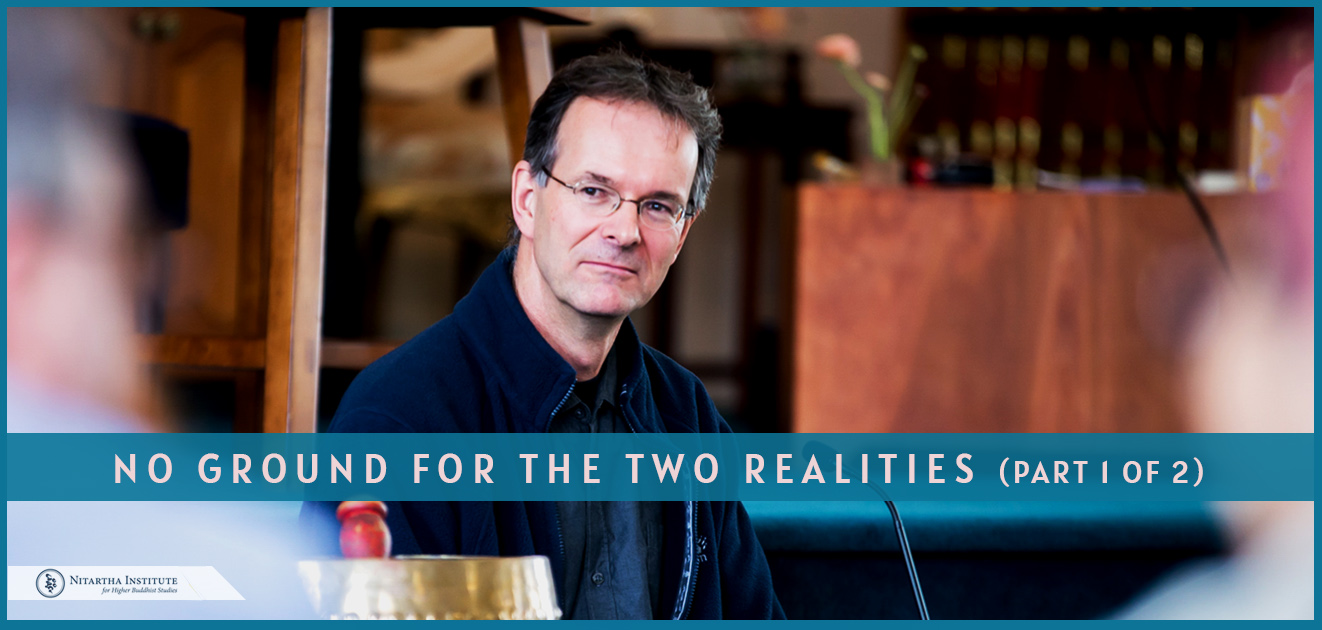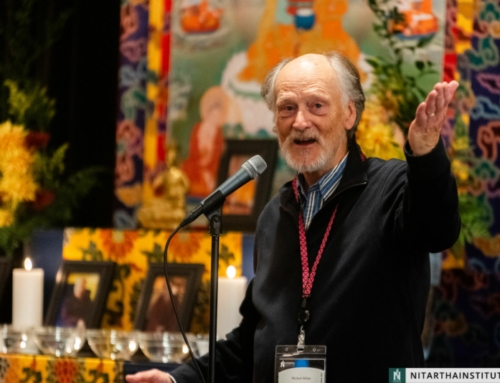This excerpt is copyrighted material, please do not use or copy without written permission from Nitartha Publications.
The following is an excerpt from The Center Of the Sunlit Sky by Karl Brunnholzl. This course is an exposition of the Middle Way philosophical tradition, based on Part One of The Center of the Sunlit Sky, expressed as the ground, path and fruition of Madhyamaka. Students explore classification of knowable objects into the two realities and cultivate certainty in the view of emptiness of all phenomena, formulating the five great Madhyamaka reasonings. The course includes presentation of personal identitylessness, the sevenfold analysis of the chariot.
No Ground For The Two Realities (PART 1 of 2)
Karl Brunnholzl
In general, there are various presentations of the two realities in the different Buddhist philosophical systems up through the Autonomists. All their presentations agree on the following general points (Autonomists doing so just conventionally) about ultimate reality: (1) it cannot be invalidated through reasoning, (2) it withstands analysis, (3) it abides ultimately as an undeceiving nature, and (4) it is the object of an unmistaken subject. Seeming reality is defined as the opposite of this.
As for Consequentialists, one looks in vain for their own special presentation of the two realities. Rather, when they dispel the mistakenness in the minds of those who uphold philosophical systems, they do so by simply putting an end to wrong views through demonstrating the inconsistencies of any position in terms of an actually or substantially existing ultimate. When Consequentialists describe what is to be adopted and rejected by giving their own presentations of seeming reality, they do not use specific new terms to establish a system of their own that explains this process. Rather—both in terms of everyday life and the Buddhist path—they engage in what is to be adopted and rejected in a way that is adjusted to the conventions of “correct” and “false” as these accord with common worldly consensus without analysis. To support this approach, they point to the Buddha, who taught the two realities in accordance with such conventions merely for the sake of helping worldly beings to finally realize true reality:
The world disputes with me, but I do not dispute with the world.
Whatever is asserted as existent in the world, that I assert as existent too.
Whatever is asserted as nonexistent in the world, that I assert as nonexistent too. 278
When Centrists talk about common worldly consensus or the perspective without analysis, they usually make a distinction between ordinary people whose minds have not been altered by philosophical views and people whose minds have been so altered. Common worldly consensus is then identified as what is consensus among those who have not been affected in this sense. However, it is obvious that there is no single universal set of things about which there is common consensus in the world, even when leaving aside philosophical views in a strict sense. There are an endless number of regional or social views or consensus on almost all issues, and in the end, majority vote or custom in a given society or group is what determines the local sets of consensus. Thus, the famous Tibetan master Gendün Chöpel (1903–1951) said that, basically, there is nobody whose mind is not affected by some sort of view. The only difference concerns what kind of view. Some people are affected by the views of their parents or their social group; others may be affected by certain religious, scientific, or political theories. In light of this, it seems impossible to pinpoint anything as common worldly consensus among people who are not affected by a view, since such people simply seem to be nonexistent. Thus, such consensus does not refer to certain social conventions, scientific theories, or commonly held views that people more or less consciously agree on.
These appearances of seeming reality are what determine our ordinary behavior. If they are not analyzed, they seem to be there and—mostly—function as we expect them to. Usually, our bodies are still there when we wake up in the morning and function in the same way as yesterday.
Can we find another way to determine the type of common consensus that is unaffected by views? It is hard to draw a sharp line here, but according to Centrists like Candrakırti, Santaraksita and Gendün Chöpel, this common consensus refers to our direct nonconceptual experiences and sense perceptions. Conceptual cognitions, except for merely labeling what we experience in this way, represent for the most part the kind of consciousness that is already affected by some view. Candrakırti is reported to have pointed to his robe and said, “If you ask me what this is, I would say this is Candrakırti’s robe. If you ask me what the building behind me is, I would say it is N›land› University. Other than that, I have nothing to say.”
Thus, common worldly consensus in the Centrist sense primarily refers to the very basic things that we perceive and label by taking them for granted, usually without even thinking about them, such as that we eat when we feel hungry, that fire burns, that water flows downhill, that there is a world of people out there who are different from ourselves, and that we want to be happy and avoid suffering. These appearances of seeming reality are what determine our ordinary behavior. If they are not analyzed, they seem to be there and—mostly—function as we expect them to. Usually, our bodies are still there when we wake up in the morning and function in the same way as yesterday. Then, we feed them and take the same road to the same place where we have been working for many years. However, as soon as we start to analyze these appearances for what they really are, they start to lose their characteristics and functions, because we step out of our familiar frame of reference within which these appearances manifest and operate. This is also obvious from modern science: For example, according to quantum physics, there are no such things as matter, roads, cars, or bodies, so who or what is driving home after an exciting day in the quantum lab? On the other hand, subjectively, we do not live our lives by behaving as quantum fields or the like. We do not relish quarks and energy waves but eat pancakes and drink coffee. Thus, one could say that common worldly consensus is mainly that which we take for granted in our everyday transactions and which functions accordingly as long as it is not questioned.





